Welfare vs Warfare: How a Powerful Military Weakens Democracy
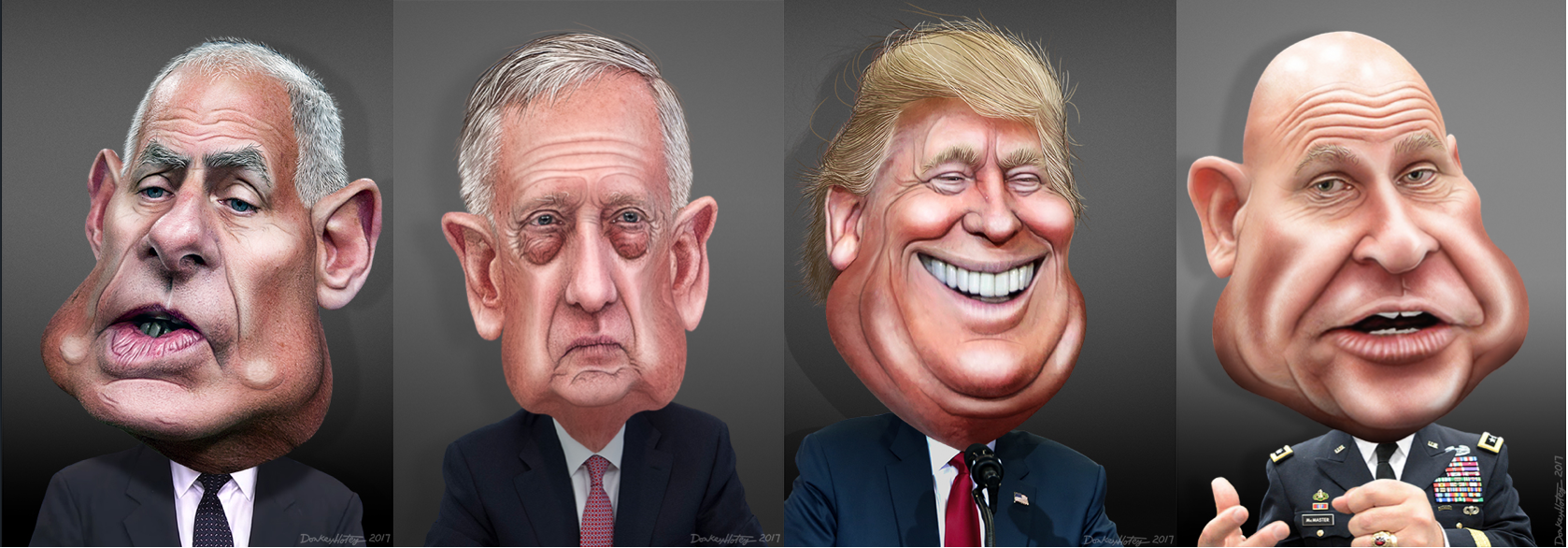
In September 2017, Congress approved an $80 billion increase to the U.S military budget, ballooning total military expenditure to approximately $700 billion for the 2018 fiscal year. The congressional increase was larger than the one requested by U.S President Donald Trump. Despite the passage of this spending bill, there has been little discussion about injecting the American military, arguably the most powerful institution in history, with $700 billion in funding. The remarkable silence on this matter points to a larger issue: that of the immense power and influence of the American military and the defense industry that profits from its endeavors.

C.W. Mills has argued that the US is largely dominated by a small group that he calls the power elite, which is comprised of powerful military, corporate, and political leaders. This group is primarily driven by a convergent and narrow set of economic and political interests, the result of which undermines the democratic institutions we value: “the military capitalism of private corporations exists in a weakened and formal democratic system containing a military order already quite political in outlook and demeanor.”1
In light of the recent budget increase, Mills’ argument proves to be helpful in our understanding of the effects of emphasis on the military. Despite constant debate about the mounting public debt, there seems to be no qualms with handing the military nearly a trillion in funds. Above all, there is no discussion whatsoever about the implications of the cost of an extended military abroad on democracy at home.
The Erosion of Rights
With the primacy of military power in American political life comes the gradual decay of democratic rights and values. Political theorist Sheldon Wolin has argued that the kind of overextended military presence and power wielded by the US necessitates the subversion of democratic institutions and processes:
Democracy will alter its character […] by operating on revised, power-expansive assumptions at home. It will, more often than not, try to manipulate the public rather than engage its members and deliberation. It will demand greater powers and brought her discretion in their use (“state secrets”), a tighter control over society’s resources, more summary methods of justice, and less patience for legalities, opposition, and clamor for socioeconomic reforms.2
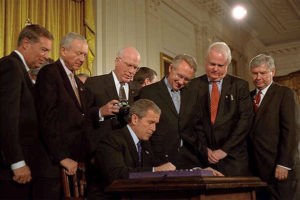
Indeed, the demands of the War on Terror had prompted the Bush administration to pass controversial legislation such as the Patriot Act, which resulted in the restriction of rights of Americans in the name of waging a war on terrorism. The Patriot Act allows for the collection of data from the phones, financial records and hard drives of Americans, as well as the arbitrary search and indefinite incarceration of those connected to terrorist activities as defined by the American government.3 The Patriot Act goes even further than this, broadening the definition of terrorism to encompass those engaged in non-violent acts of dissent or protest. One notable example of these practices comes from the Obama administration’s decision to relax restrictions on the National Security Agency (NSA) concerning its warrantless collection and sharing of the private data of Americans. Indeed, many politicians have used the War on Terror as a reason to claw back the civil liberties of the American people, often without widespread outrage.
Increasing Executive Power
An extended military not only allows for the scaling back of basic rights, but it also requires a highly centralized system of military command. Barack Obama infamously presided over a vast network of drone warfare that gave the Pentagon broad license to carry out “thousands of covert airstrikes in nations where the U.S. was not at war, resulting in hundreds of civilian casualties,” as well as the “premeditated killing of an American citizen without charge or trial.”
Donald Trump, for his part, has ensured that the Pentagon has a present and active role within his administration. Several key positions within the White House are currently occupied by military men, including the Department of Defense (James Mattis), the National Security Advisor (H.R. McMaster), and the White House Chief of Staff (John Kelly). McMaster is a Lieutenant General in the US Army while Mattis and Kelly were formerly generals in the US Marine Corps. The concentrated presence of military men in political roles has evidently lead to a heightened level of interventionism in American action overseas.
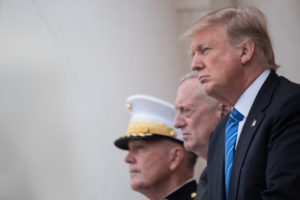
Under Trump’s authority, the Pentagon has carried out several acts of military aggression, including unprecedented use of the GBU-43/B Massive Ordnance Air Blast Bomb (MOAB) in Afghanistan. Trump has also given Mattis the power to step up troop levels in Afghanistan, prompting the Defense Secretary to send nearly 4000 more soldiers to the region the US has occupied for the past sixteen years. The controversial missile strike on Syrian airfields in April 2017 was also notably encouraged by Mattis and McMaster. Mattis has also stated that “civilian casualties are a fact of life” in times of war, a dangerous statement given the broad license Trump has given him with regard to control over military policy.
Despite a majority of Americans distrusting Trump on key foreign policy issues, and largely opposing an increase in military expenditure, the American government rarely consults the people in its actions overseas. The concentration of resources and authority necessary to project American military power around the globe precludes the possibility of democratic involvement. As Wolin points out:
“It makes no sense to ask how a democratic citizen could “participate” substantively in imperial politics; hence it is not surprising that the subject of empire is taboo in electoral debates. No major politician or party has so much as publicly remarked on the existence of an American empire.”4
A Profitable Military Industrial Complex
The domestic economic effects of the American military can be clearly felt by studying the American government’s profligate spending on its military over the past sixteen years.
The U.S Department of Defense has released a report detailing the cost of American military operations from 2001 to mid-2017. The report indicates that American citizens have footed the bill for $1.43 trillion worth of military escapades, amounting to a $250 million daily expense since the War on Terror began sixteen years ago. The previous $619 billion budget alone was almost three times more than China – the next-biggest spender. The previous budget was also notably larger than those of the next eight biggest military spenders combined, many of which are American allies.
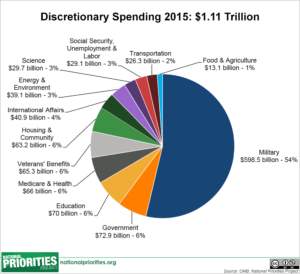
Several critics argue that the U.S does not have the money to pay for social programs such as universal Medicare or tuition-free college, but there is no outrage at the unfathomable amount of money the U.S is spending on its omnipresent military. The $80 billion increase in spending alone could pay for tuition-free college. The expected tax increase necessary to pay for universal healthcare is notably less than the $700 billion military budget. It is worth asking what the US government could be capable of if more than half of discretionary spending were not directed to toward the military machine. This skewed allocation of resources weakens the ability of the state to provide essential services that many would consider a right.
The economic incentive behind the massive American military edifice is simple enough: war is immensely profitable. As Mills argues, there is a serious convergence in interests between “those who control the major means of production and those who control the newly enlarged means of violence.”5
Take, for example, Trump’s April 2017 decision to launch Tomahawk missiles into Syrian territory. In the aftermath of the strike, Raytheon, the arms dealer that manufactures the Tomahawk missile, saw its stock price soar. Ironically, the very governments that espouse notions of free-trade and non-intervention in the economy are the ones propping up the powerful military-industrial complex about which President Dwight Eisenhower warned in 1961. As such, a certain military Keynesianism has emerged in the U.S that “serves U.S. geopolitical designs, as well as elite privilege, ensuring not only massive business profits domestically but also the freest possible terrain for global investment and the control of markets.”6
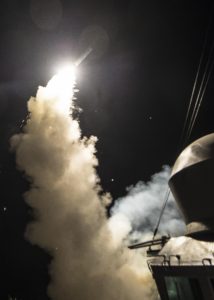
The military Keynesianism practiced by the US since the end of World War II is predicated upon the close relationship between government and the arms industry, and the heavy influence of corporate lobbying. A striking instance of this comes from the tens of billions of dollars in federal contracts related to the Iraq war made by Kellogg Brown and Root (KBG), a former subsidiary of Halliburton, an oil fields services company. Dick Cheney, who served as Defense Secretary under George H. W. Bush, was the CEO of Halliburton from 1995 to 2000 and made $44 million during this time. Cheney would later go on to become Vice President during the George W. Bush administration, raising many questions about the “revolving door” relationship between the political and corporate spheres.
The companies that profit from this military Keynesianism requires, most of all, a constant state of mobilization directed at some designated enemy.7 The constant state of fear manifested through the waging of a global War on Terror produces an immensely profitable war economy that, as has been shown above, directs resources away from democratic domestic programs and services and into the pockets of Mills’ power elite.
An Ailing Democracy
This is, of course, not to argue that a mere reallocation of resources from the military to universal healthcare will solve America’s socio-economic problems. But the enthusiasm with which many in government endorsed the $80 billion spending increase demonstrates where the priorities of the government lie. It shows that the handwringing over the supposed cost of initiatives that aim to secure the wellbeing of society is nonsense at best.
The costs of such a powerful and extended military are not only felt in the public purse. Their effects extend to the highest levels of government, and pierce deeply into the roots of American democratic structures. The profitability of an industry founded upon the sustenance of a deadly military apparatus can only lead to a decline in the well-being of the people at large. The centralization of power required to perpetuate a system of endless war results in an erosion of democratic rights, and an inability for the citizenry to make reflective decisions about how the power America wields should be used. These problems cannot be remedied by simply casting a ballot. Their resolution will involve a larger discussion about the nature of American military power, and a dedication to the well-being of society. This can only take place with a bottom-up approach to holding those in power accountable.
Credit for feature image: (from left to right), caricatures of John Kelly, James Mattis, Donald Trump, and H.R. McMaster. From Trump Administration album by DonketHotey. Flickr Creative Commons. https://flic.kr/s/aHskHMphrF.
This article has been edited by Sarie Khalid
1. C.W. Mills, The Power Elite (New York: Oxford University Press, 1950), 276.↩
2. Sheldon Wolin, Democracy Incorporated (Princeton: Princeton University Press, 2008), 247.↩
3. Carl Boggs, Imperial Delusions: American Militarism and Endless War (Lanham, MD: Rowman & Littlefield, 2005), 117.↩
4. Wolin, Democracy Incorporated, 192.↩
5. Mills, Power Elite, 276.↩
6. Boggs, Imperial Delusions, 24.↩
7. Ibid., 25↩
